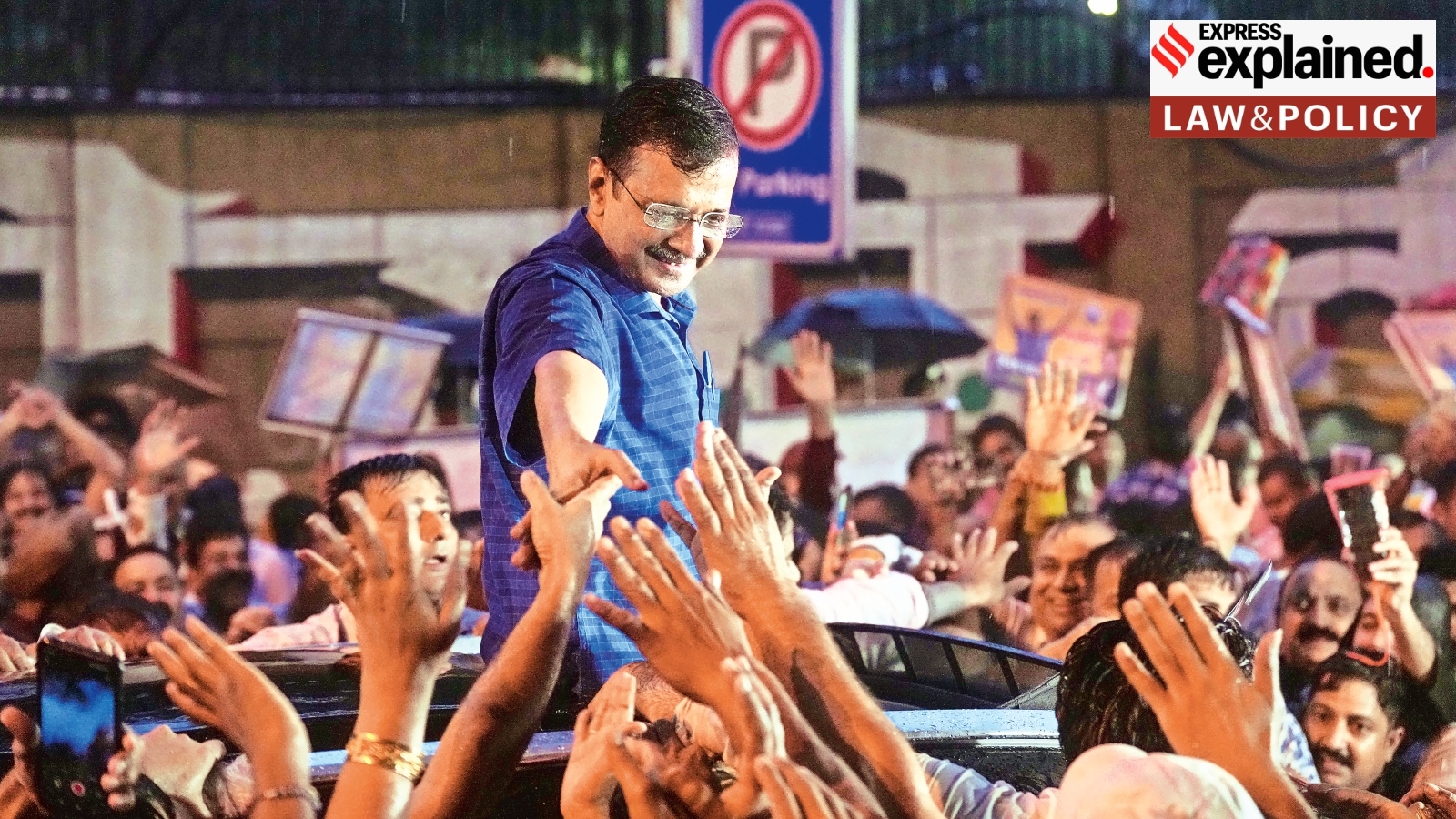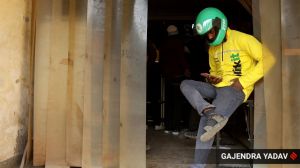Unpacking Kejriwal bail order
Where the judges on SC Bench agreed, disagreed
 Delhi Chief Minister Arvind Kejriwal acknowledges supporters after walking out of Tihar Jail in New Delhi on Friday. PTI
Delhi Chief Minister Arvind Kejriwal acknowledges supporters after walking out of Tihar Jail in New Delhi on Friday. PTIArvind Kejriwal walked out of Tihar Jail on Friday evening, hours after a Supreme Court Bench of Justices Surya Kant and Ujjal Bhuyan delivered separate, concurring judgments granting him bail in the CBI case on the alleged “scam” in the Delhi excise policy.
The judges, however, delivered differing opinions on whether the Delhi Chief Minister’s arrest by the CBI in June 2024 was necessary in the first place. Justice Kant upheld the arrest; Justice Bhuyan held that the grounds for arrest were “wholly untenable”.
Why did the two judges disagree on the necessity to arrest Kejriwal? And what were their reasons for granting him bail?
Timeline of the case
Kejriwal was arrested twice in connection with the same excise policy case, first by the Enforcement Directorate (ED) on March 21, 2024, and then by the CBI on June 26, when he was already in custody.
On July 12, the Supreme Court granted Kejriwal interim bail in the ED case. However, he was not released from jail because the CBI complaint proceedings were pending at the time. On August 5, the Delhi High Court upheld the CBI’s decision to arrest Kejriwal, and directed him to approach the trial court for bail.
On August 12, Kejriwal challenged the Delhi HC’s order at the Supreme Court. On August 14, the court refused to grant him interim bail, and heard arguments from both sides over the course of two hearings on August 23 and September 5. It delivered its verdict on Friday.
Diverging opinions on the necessity of arrest
During the hearings, both sides relied on Sections 41(1)(b) and 41A of the Code of Criminal Procedure, 1973 (CrPC). Section 41(1)(b) lays down the conditions for arrest without a warrant, and Section 41A deals with the appearance of an accused before police in cases where arrest is not required.
Kejriwal argued that none of the requirements for arrest listed under Section 41(1)(b) were met in his case, and that he was not served with a notice by police as required under Section 41A before he was interrogated by the CBI in June.
JUSTICE KANT held that Section 41(1)(b) does not apply in this case as the CBI Special Judge had allowed the agency’s application to arrest Kejriwal on June 26. He also held that Section 41A “does not envisage or mandate the issuance of a notice to an individual already in judicial custody” — Kejriwal was already incarcerated in connection with the ED case at the time.
CrPC Section 41A(3) states that the police shall not arrest a person who “complies and continues to comply with the notice” of appearance under this section unless the police officer records the reasons why arrest is necessary.
Justice Kant held that the CBI had “clearly recorded the reasons as to why they deemed the Appellant’s arrest necessary” in its application. The CBI had argued that Kejriwal gave “evasive replies” during interrogation, and it was necessary to confront him with the evidence to uncover the larger conspiracy.
JUSTICE BHUYAN did not accept this justification for Kejriwal’s arrest.
He held: “It cannot be the proposition that only when an accused answers the questions put to him by the investigation agency in the manner in which the investigating agency would like the accused to answer, would mean that the accused is cooperating with the investigation.”
He also referred to Article 20(3) of the Constitution of India which provides that “No person accused of any offence shall be compelled to be a witness against himself”, and held that an accused has a right to remain silent.
Justice Bhuyan questioned the timing of Kejriwal’s arrest by the CBI. He noted that the agency had registered the case in August 2022, but had not named Kejriwal as an accused in the chargesheet — and that it had filed an application for his arrest only on June 25, 2024, after the Chief Minister had been granted bail in the ED case just days earlier on June 20. (The operation of the order passed by Vacation Judge Nyay Bindu was stayed by Delhi High Court the next day.)
“Such action on the part of the CBI raises a serious question mark on the timing of the arrest; rather on the arrest itself,” Justice Bhuyan said. “For 22 months, CBI does not arrest the appellant but after the learned Special Judge grants regular bail to the appellant in the ED case, CBI seeks his custody.”
‘Complete agreement’ on granting bail to Kejriwal
JUSTICE KANT held that “the prolonged incarceration of an accused person, pending trial, amounts to an unjust deprivation of personal liberty”. In this case, there were 17 accused persons, 224 witnesses, multiple chargesheets, and extensive documentation to consider, he noted.
“These factors suggest that the completion of the trial is unlikely to occur in the immediate future,” Justice Kant said.
He also held that Kejriwal’s case fulfilled the “triple test” for bail because:
- The evidence is already in the CBI’s possession so there is no possibility of tampering with it;
- Kejriwal’s “position” and his “roots” in society mean that he is not a flight risk;
- In case the CBI’s concern that he will tamper with witnesses comes true, the necessary consequences will follow.
Justice Kant also dismissed the CBI’s argument that Kejriwal should have gone to the trial court to seek bail first instead of directly approaching the High Court. If this argument was to be accepted, the Delhi HC should have immediately sent him to the trial court instead of hearing arguments in his bail application, he said.
“Bail being closely tied to personal liberty, such claims should be adjudicated promptly on their merits, rather than oscillating between courts on mere procedural technicalities,” Justice Kant said.
JUSTICE BHUYAN held that he was “in complete agreement with the conclusion and direction of his Lordship (Justice Kant) that the appellant (Kejriwal) should be released on bail”.
- 01
- 02
- 03
- 04
- 05






































